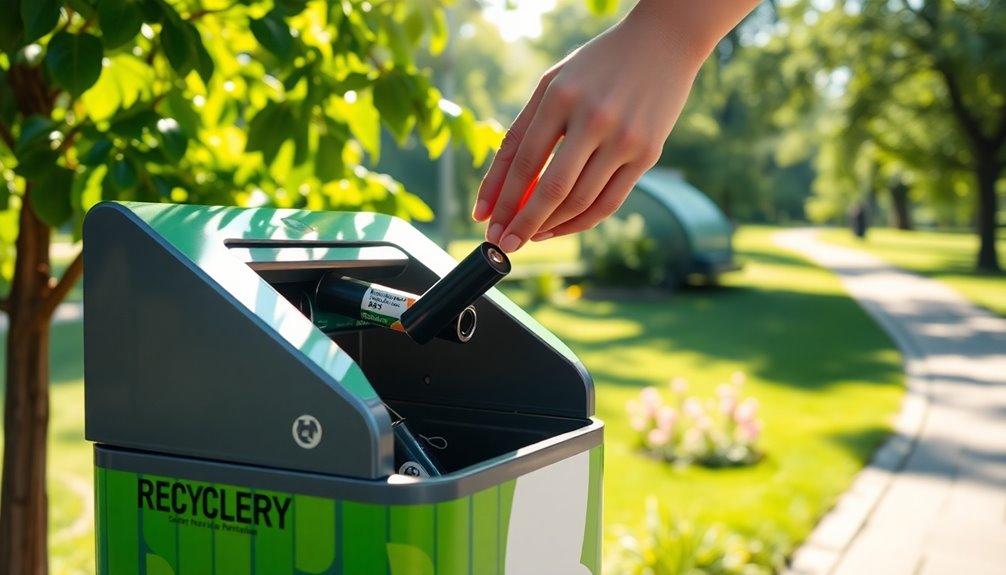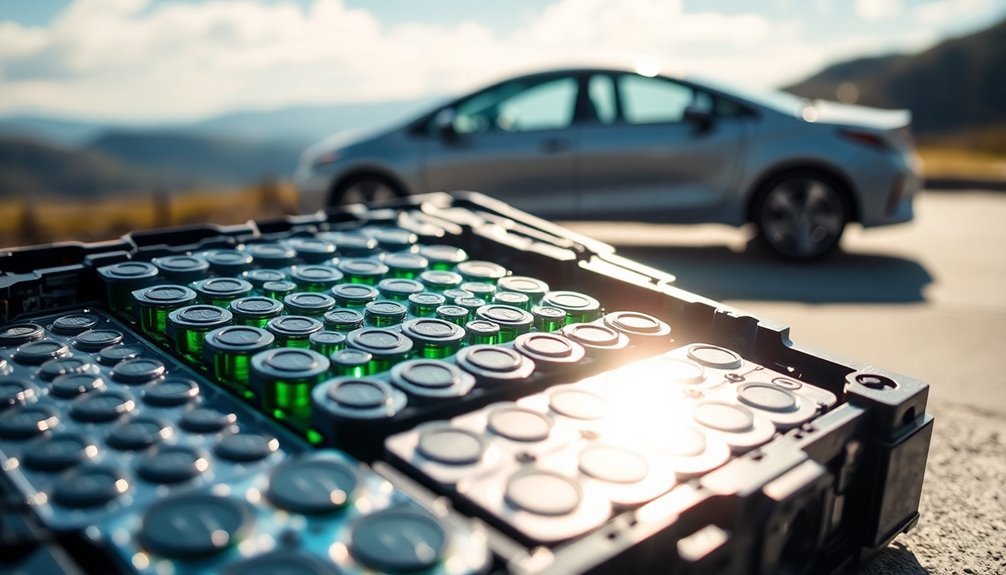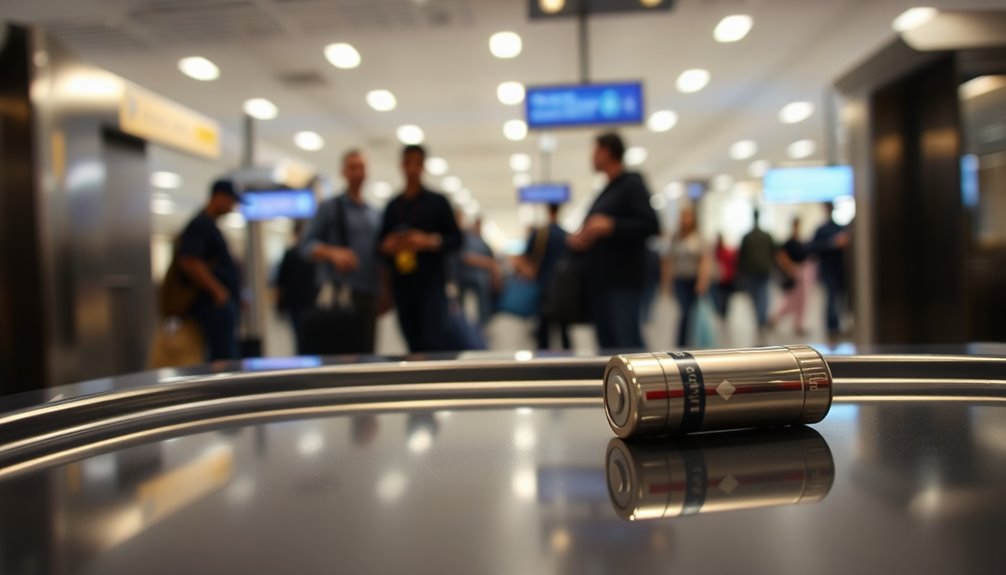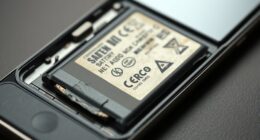To dispose of batteries safely and eco-friendly, you should utilize dedicated recycling drop-off locations or participate in community hazardous waste events. Don't toss batteries in the regular trash; they contain toxic materials that harm the environment. Tape the terminals of 9-volt batteries to prevent fire risks, and store used batteries in a safe, dry place until you can recycle them. Organizations like Call2Recycle can help you find convenient drop-off sites. By recycling, you're not only protecting the environment but also recovering valuable materials. Discover more tips and methods to guarantee your battery disposal is as safe as possible.
Key Takeaways
- Utilize designated battery recycling drop-off locations to ensure safe disposal of used batteries.
- Participate in community recycling events for hazardous waste to properly dispose of batteries.
- Tape the terminals of 9-volt batteries to prevent fire risks before disposal.
- Follow local regulations and guidelines for battery disposal to avoid environmental contamination.
- Use resources like Call2Recycle.org to find accessible recycling options in your area.
Understanding Battery Types

Batteries come in various types, each designed for specific uses and disposal methods.
You'll find single-use batteries like AA and AAA, perfect for low-to-moderate power devices. On the other hand, rechargeable batteries, such as lithium-ion and nickel-cadmium, can be reused up to 1,000 times, making them a more eco-friendly option.
Lead-acid batteries, commonly found in vehicles, contain hazardous materials and need special disposal due to their lead and sulfuric acid components. Additionally, button cell batteries, which power devices like watches and hearing aids, may contain toxic substances like mercury and silver oxide, requiring careful handling.
Understanding these battery types helps you make informed decisions about their use and disposal, ensuring environmental safety.
Safe Disposal Practices
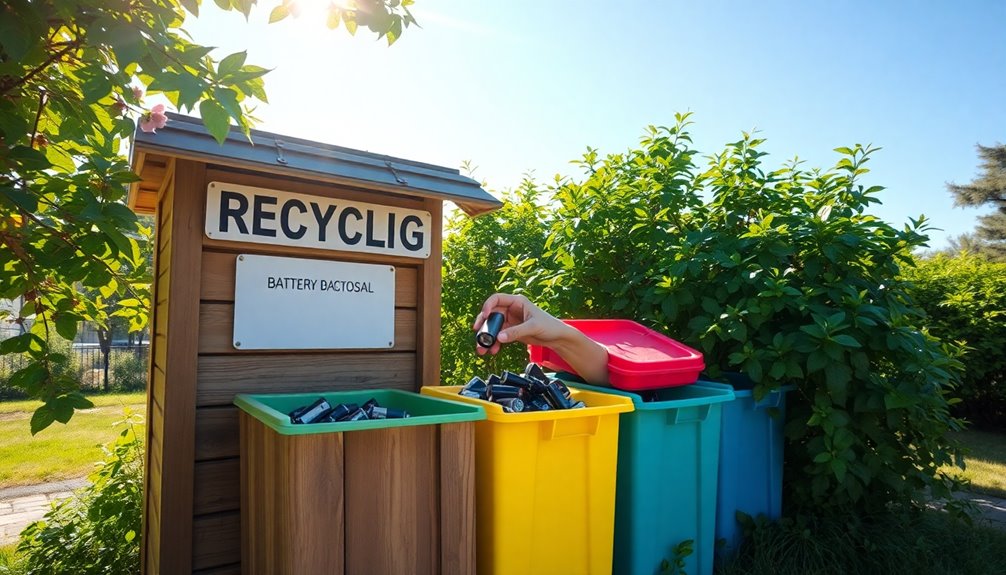
When disposing of batteries, it's essential to follow safe practices to protect both yourself and the environment.
Always tape the terminals of 9-volt batteries to prevent fire risks, as they can produce current even when dead.
Rechargeable batteries, like lithium-ion and nickel-cadmium, shouldn't go in the trash; instead, take them to a battery recycling location.
Check for hazardous waste collection events organized by local municipalities for safe disposal options.
You can also use programs like Call2Recycle, which offer accessible battery drop-off sites and promote proper disposal practices.
By following these environmentally friendly methods, you'll reduce safety risks and help keep hazardous materials out of landfills.
Make responsible choices for a cleaner, safer future!
Alkaline Battery Guidelines
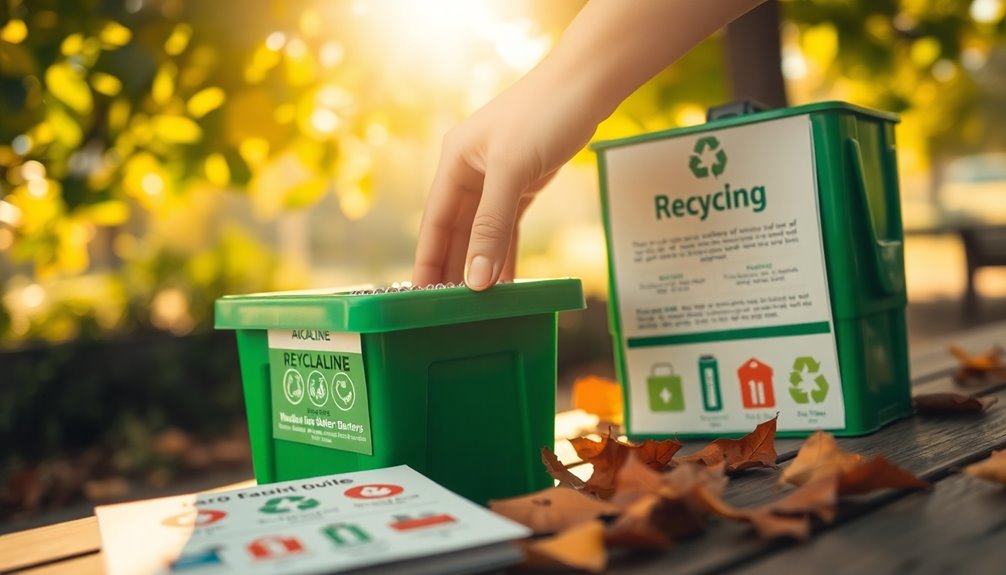
For those dealing with household devices, understanding how to handle alkaline batteries is important.
These batteries, like AA, AAA, C, D, and 9-volt, are typically classified as nonhazardous, so you can dispose of batteries in regular trash in most states.
However, it's smart to collect used alkaline batteries in a safe container. Make sure to tape the terminals of 9-volt batteries to prevent fire risks before disposal.
Although they're nonhazardous, these batteries contain materials that could harm the environment, so recycling is encouraged whenever possible.
The Mercury-Containing and Rechargeable Battery Management Act has phased out mercury in alkaline batteries, making them safer for disposal in landfills.
Always prioritize environmentally responsible practices!
Rechargeable Battery Disposal
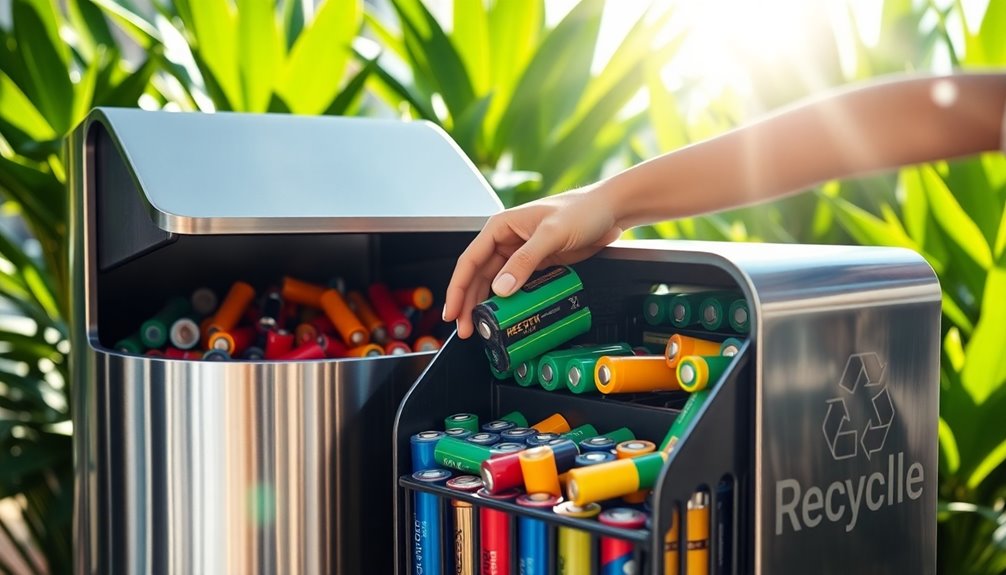
Although rechargeable batteries offer convenience and longevity, proper disposal is essential due to their hazardous materials.
Never dispose of rechargeable batteries, like Ni-Cd and lithium batteries, in regular trash or curbside recycling bins. Instead, look for designated recycling facilities or participate in hazardous waste collection programs.
Many retailers, such as Home Depot, have partnered with organizations like Call2Recycle to provide drop-off points for recycling.
Before you dispose of your rechargeable batteries, store them safely in their original packaging or a non-conductive container to prevent short circuits.
With only 5% of lithium-ion batteries recycled globally in 2022, your participation in recycling programs is vital to prevent environmental contamination and recover valuable materials.
Button Cell Battery Care
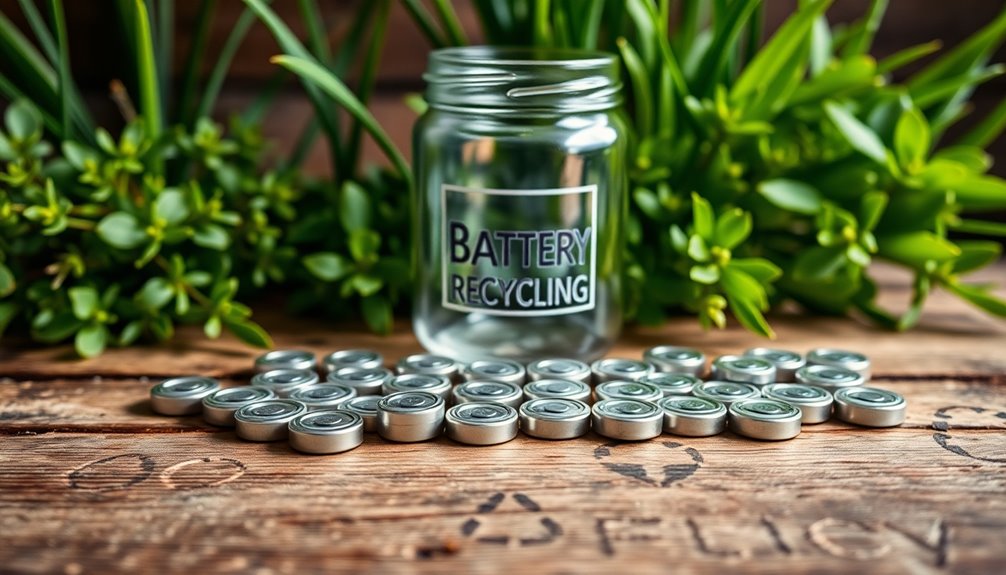
When handling button cell batteries, you need to prioritize proper storage and disposal to keep yourself and the environment safe.
Always store them in their original packaging or a non-conductive container, and remember to tape the terminals before disposal.
Knowing the right methods for getting rid of these batteries is essential to prevent hazardous materials from causing harm.
Proper Storage Practices
Properly storing button cell batteries is essential for safety and longevity. By following proper storage practices, you can reduce risks of leakage and damage while guaranteeing safe battery disposal later on.
Here's how to keep your batteries in top condition:
- Store them in their original packaging or a non-conductive container to prevent short circuits.
- Keep batteries in a cool, dry place, away from direct sunlight and heat sources.
- Clearly label containers to easily identify battery type and prevent mixing, avoiding potential chemical reactions.
Regularly inspect your stored button cell batteries for signs of leakage or swelling.
If you find damaged batteries, handle them with caution and follow appropriate handling guidelines for disposal.
Taking these steps will guarantee your batteries remain safe until you're ready to dispose of them.
Safe Disposal Methods
How can you guarantee that your button cell batteries are disposed of safely?
First, remember that these batteries contain hazardous materials like mercury and silver, so they shouldn't go in your regular trash. Instead, batteries should be recycled through designated recycling programs.
Locate authorized recycling centers or participate in household hazardous waste collection or hazardous waste collection events in your area. You can also check with retailers that accept button cell batteries for proper disposal.
Always follow the manufacturer's guidelines for specific instructions, especially when you need to dispose of rechargeable batteries.
Automotive Battery Recycling
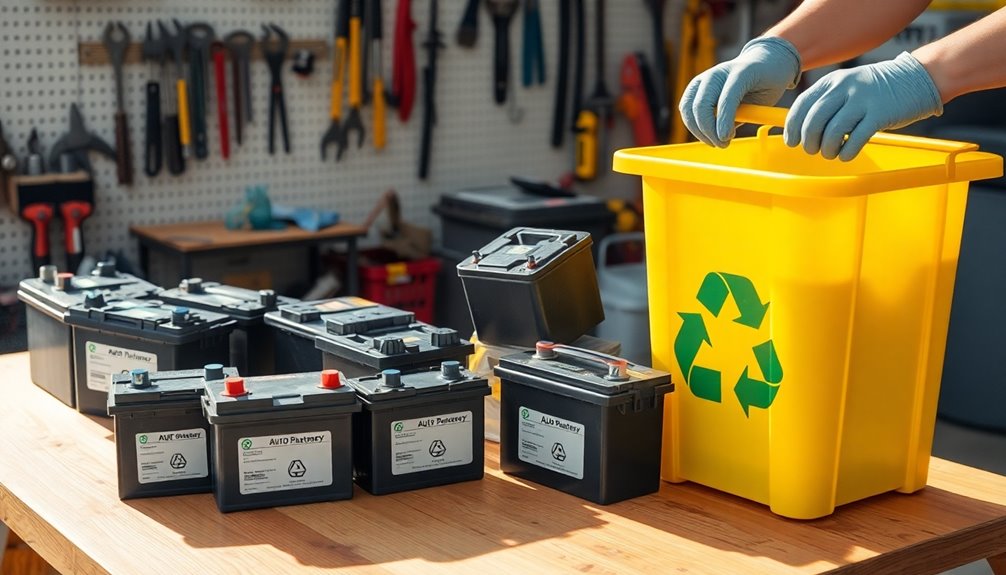
Although automotive batteries are essential for vehicle operation, their disposal is a serious environmental concern.
These lead-acid batteries contain hazardous materials like lead and sulfuric acid, making proper recycling vital. In Texas, it's illegal to throw them in the trash, highlighting the need for compliance with regulations.
Consider these key points about automotive battery recycling:
- Approximately 95% of lead-acid batteries are recycled in the U.S.
- Many auto parts stores offer recycling programs, sometimes with incentives.
- Around 60% of lead used in new batteries comes from recovered materials.
Finding Recycling Locations
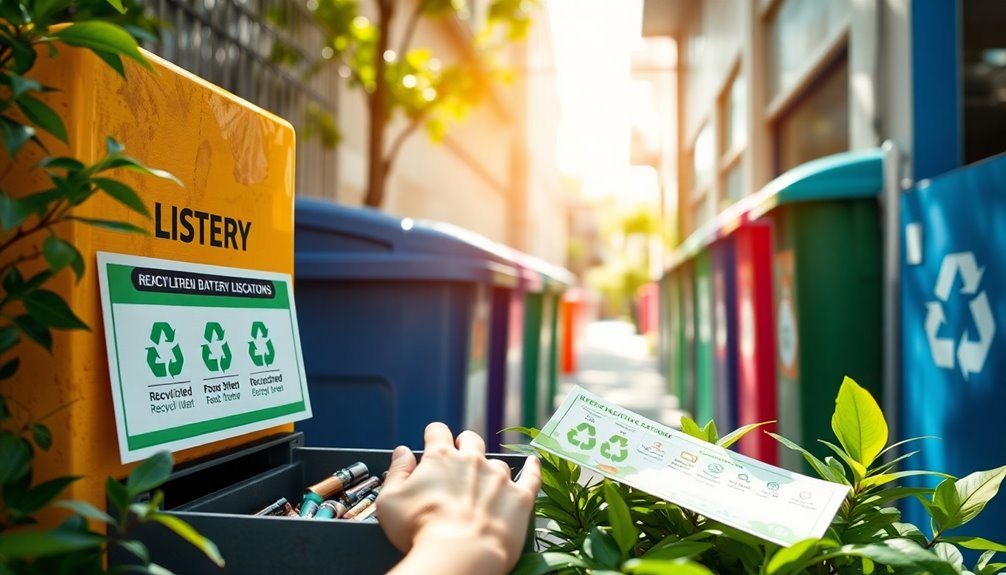
Wondering where to recycle your old batteries? Start by visiting Call2Recycle.org, where you can find battery recyclers and recycling centers near you by entering your zip code.
Many Home Depot stores have battery recycling bins, making responsible disposal easy. Don't forget to check with your local municipalities, as they often host hazardous waste collection events that include battery recycling.
If you prefer a more convenient option, some manufacturers offer mail-in recycling programs specifically for batteries.
For lead-acid batteries, auto care retailers are your go-to locations, ensuring these are disposed of in compliance with environmental regulations.
Safe Storage Tips
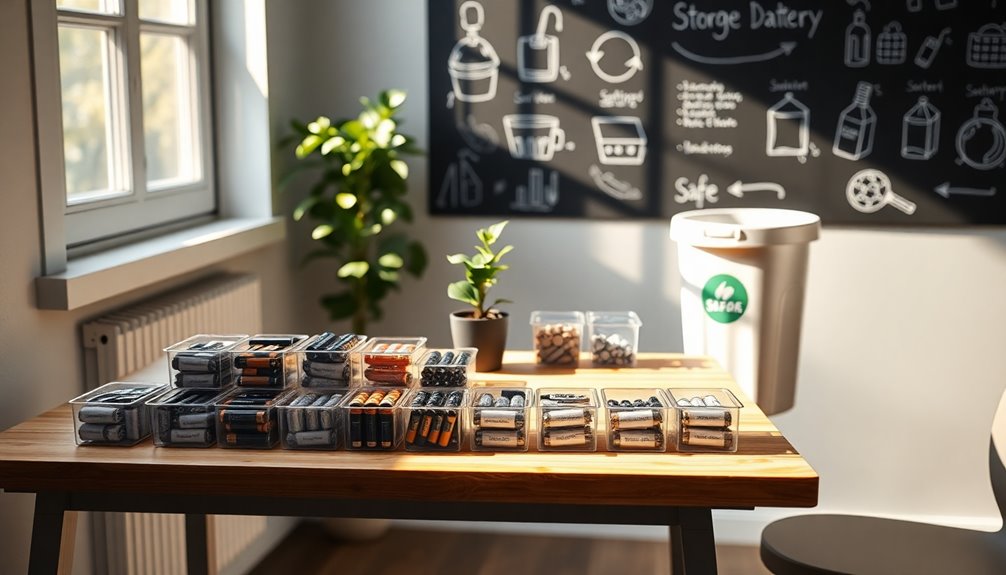
Proper battery storage is essential for safety and longevity. To guarantee that your batteries remain safe and effective, follow these tips:
- Store batteries in a cool, dry place away from flammable materials to minimize fire risks.
- Use non-conductive storage containers, like the original packaging, to prevent accidental short circuits.
- Regularly check for any signs of leakage or damage, and label storage containers for easy identification.
Avoid mixing different types of batteries, as this can create hazardous situations and complicate disposal.
By practicing safe storage, you'll protect both your batteries and the environment, guaranteeing that your rechargeable options last longer and reducing any potential risks associated with hazardous materials.
Stay vigilant and handle batteries with care!
Environmental Impact Awareness

Understanding the environmental impact of battery disposal is vital for everyone. Improper disposal can lead to environmental contamination, releasing toxic metals like lead and mercury into our soil and water.
Each year, over three billion dry-cell batteries are purchased in the U.S., contributing considerably to landfill waste if not recycled. By recycling just five rechargeable batteries per household, you could help prevent 48 million batteries from ending up in landfills.
Increased public awareness of battery recycling is essential. It encourages participation in recycling programs, promoting sustainable recovery of valuable materials like lithium and cobalt.
Frequently Asked Questions
How to Dispose of a Battery That Is About to Explode?
If you suspect a battery's about to explode, stop using the device immediately.
Carefully place it in a non-flammable, insulated container away from flammable materials.
Don't puncture or dismantle it, and avoid water.
Keep it out of extreme temperatures.
Wear protective gloves and goggles while handling it.
Then, contact your local hazardous waste facility or recycling center for safe disposal instructions.
Your safety is the priority, so act quickly and cautiously.
Can You Throw Away Alkaline Batteries in Texas?
You might think tossing alkaline batteries in the trash is as easy as pie, but there's more to it.
In Texas, you can throw away alkaline batteries, but it's best to recycle them whenever possible. By recycling, you help recover valuable materials and cut down on landfill waste.
Just remember to tape the terminals of 9-volt batteries to avoid fire hazards, and check if local programs can make your disposal even greener.
Does Home Depot Really Recycle Batteries?
Yes, Home Depot really recycles batteries! When you visit their stores, you'll find designated bins for various battery types, including rechargeable lithium-ion and nickel-cadmium.
It's a free service, so you can responsibly drop off your used batteries without any hassle. By participating in this program, you're helping reduce hazardous waste in landfills, making a positive impact on the environment.
What Is the Disposal Method for Batteries?
Think of batteries like ticking time bombs; if you don't dispose of them properly, they can cause environmental harm.
For alkaline batteries, you can often toss them in the trash, but check your local regulations. Rechargeable and button cell batteries need special recycling.
Always return lead-acid automotive batteries to a retailer.
Conclusion
You might think tossing batteries in the trash is harmless, but it's a risky move for our planet. By choosing to dispose of them properly, you're not just protecting the environment; you're also safeguarding your community from potential hazards. Embrace the eco-friendly methods we discussed, and you'll be part of the solution rather than the problem. So, let's turn what could be waste into a chance for recycling and a healthier Earth for future generations!

